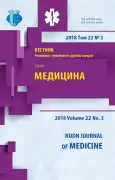ВЫБОР СЕТЧАТОГО ИМПЛАНТАНТА ДЛЯ ПЛАСТИКИ LICHTENSTEIN У МУЖЧИН РЕПРОДУКТИВНОГО ВОЗРАСТА
- Авторы: Климов АЕ1, Попов ВС1, Бархударов АА1, Юрий АВ2
-
Учреждения:
- Российский университет дружбы народов
- Городская клиническая больница им. В.В. Виноградова
- Выпуск: Том 22, № 3 (2018)
- Страницы: 249-257
- Раздел: ХИРУРГИЯ. АНДРОЛОГИЯ
- URL: https://journal-vniispk.ru/2313-0245/article/view/345212
- DOI: https://doi.org/10.22363/2313-0245-2018-22-3-249-257
- ID: 345212
Цитировать
Полный текст
Аннотация
В статье разбираются вопросы влияния полипропиленовых и полиэстеровых сетчатых имплантов на половую функцию мужчин репродуктивного возраста после перенесенной пластики пахового канала в методике Lichtenstein. Для адекватного сравнения групп пациентов с установленными полипропиленовыми и полиэстеровыми имплантантами разработан алгоритм их обследования. Для комплексной оценки половой функции в исследовании она подразделена на две компоненты. Фертильность 155 больных оценена через анализ спермиологических исследований, выполненных у молодых больных с паховыми грыжами. В связи с возможным развитием иммунологической формы стерильности на фоне установленных сетчатых эндопротезов спермиологическое исследование у каждого больного было дополнено Mar-тестом с целью поиска антиспермальных антител. Для оценки копулятивной компоненты половой функции больные обеих групп были анкетированы согласно опроснику «Международный индекс эректильной функции, версия 5» (МИЭФ 5). После статистической обработки данных, собранных на основании разработанного алгоритма, статистически значимых различий между группами больных с установленными полипропиленовыми и полиэстеровыми имплантантами выявлено не было. Однако у одного больного в группе, где использовались полипропиленовые сетчатые эндопротезы, выявлены изменения в спермиологическом анализе, взятого после оперативного пособия, которые могут говорить о резком снижении качества эякулята, вплоть до развития стерильности. Также у этого пациента зафиксировано снижение ниже нормы балла МИЭФ 5. На основании результатов исследования сделаны выводы и даны рекомендации для практикующих хирургов о возможности применения полипропиленовых и полиэстеровых сетчатых эндопротезов при пластики задней стенки пахового канала у мужчин репродуктивного возраста.
Ключевые слова
Об авторах
А Е Климов
Российский университет дружбы народов
Автор, ответственный за переписку.
Email: popov_vs@rudn.university
В С Попов
Российский университет дружбы народов
Email: popov_vs@rudn.university
А А Бархударов
Российский университет дружбы народов
Email: popov_vs@rudn.university
А В Юрий
Городская клиническая больница им. В.В. Виноградова
Email: popov_vs@rudn.university
Список литературы
- Belokonev V.I., Ponomareva Yu.V., Kovaleva Z.V., Kashkarov V.A., Gubsky V.М. Unsolved problems in herniology. Materials and theses “II All-Russian Congress of Herniologists”. Moscow, 2017. P. 13.
- Demidov D.G., Pavlenko V.V. About preperitoneal plastic of inguinal and femoral hernias. Materials of the scientific-practical seminar “Alloplasty of inguinal hernias or traditional hernioplasty”. Moscow, 2003. P. 17—18.
- Bendavid R.H. Abdominal wall hernias. New York, Springer, 2001. P. 792.
- Tabuyka A.V. Effect of a reticular mesh implant on the reproductive organs in modeling the operation of hernioplasty: dis.. cand. honey. sciences: 14.00.27; [Place of protection: Ros. un-t friendship of peoples]. Moscow, 2009. P. 56—58.
- Kirilov Yu.B., Aristarkhov V.G., Zotov I.V., Astrakhantsev V.G., Zhiborev B.N. Influence of the inguinal hernia on the morphofunctional state of the testicle. Ryazan, 2006. P. 22—23.
- Bucknall T.E., Cox P.J., Ellis H. Burst abdomen and incisional hernia: a prospective study of 1129 major laparotomies. Br. Med. J. (Clin. Res. Ed). 1982. Vol. 284, No. 6320. P. 931—933.
- Protasov A.V., Vinogradov I.V., Blokhin A.V. Effect of implant material on inguinal hernioplasty on the reproductive function of men. Proceedings of the IX conference of the herniologist society “Actual questions of herniology”. Moscow, 2012. P. 175.
- Kalish Yu.I., Ametov L.Z., Shayusupov A.R., Yigitaliev S. Experience of treatment of chronic parotrotic infection after allogernioplasty. Materials and theses “The 1st All-Russian Congress of Herniologists”. Moscow, 2016. P. 48.
- Messenger D.E., Aroori S., Vipond M.N. Five-year prospective follow-up of 430 laparoscopic totally extraperitoneal inguinal hernia repairs in 275 patients. Ann R Coll Surg Engl. 2010, April. 92 (3). P. 201—205.
- Picchio M. et al. Randomized Controlled Trial of Preservation or Elective Division of Ilioinguinal Nerve on Open Inguinal Hernia Repair With Polypropylene Mesh. Arch Surg. 2004. 139. P. 755—758.
- Protasov A.V. and others. The use of a seamless technique for the implantation of reticular endoprostheses in the surgery of inguinal hernias. Proceedings of the III International Conference “Modern Technologies and Opportunities of Reconstructive and Reconstructive and Aesthetic Surgery”. Moscow, 2012. P. 121—122.
- Zhang C. et al. Self-gripping versus sutured mesh for inguinal hernia repair: a systematic review and meta-analysis of current literature. Journal of Surgical Research. 2013. 185. P. 653—660.
- Porrero J.L. et al. Proposed technique for inguinal hernia repair with self-gripping mesh: avoiding fixation to undesired structures. Hernia, 2014. DOI 10.1007/ s10029-014-1315-8.
- Parshikov V.V., Snopova L.B., Dvornikov A.V., Mironov A.A., Prodanets N.N., Zhemarina N.V. To the question of the effect of plastics on I.L. Lichtenstein on the male reproductive system. Proceedings of the X conference “Actual questions of herniology”. Moscow, 2013. P. 112—114.
- Bitenskaya E.P., Mishustin A.M., Kulikovsky V.F., Soloshenko A.V., Yarosh A.L. Tissue reaction during the implantation of synthetic endoprostheses with nanosized diamond-like carbon coating. Materials and theses “The 1st All-Russian Congress of Herniologists”. Moscow, 2016. P. 25.
- Motavkin P.A. Course of lectures on histology. Vladivostok: Medicine of the Far East, 2007. P. 311—315.
- Gritsulyak B.V., Klipich V.I., Lesin A.I Ultrastructural change in the hemato-testicular barrier for inguinal and scrotal hernia. “Application of electron microscopy in materials science, biology and medicine”. Abstracts. Kiev, 1979. Issue 2. P. 93—94.
- Romashchenko P.N., Kurygin A.A., Semenov V.V. Choice of a variant of hernioplasty in patients with inguinal hernia. Materials and theses “II All-Russian Congress of Herniologists”. Moscow, 2017. P. 81.
- Khodak V.A., Baburin A.B., Samsonov A.A. Features of local blood circulation when performing prosthetic plastics of the inguinal canal in men. Proceedings of the X conference “Actual questions of herniology”. Moscow, 2013. P. 115—116.
- Kirillov Yu.B. Morphological changes in the testicles during inguinal hernia. Surgery. 2003. № 2. P. 65—67.
- Blokhin A.V. Influence of mesh implant on postoperative period during inguinal hernioplasty. MD Theses. Moscow, 2017. P. 78—79.
- Gevorgyan A.A. Comparative aspects of the influence of modern reticular implants on the reproductive system of white mongrel male rats after modeling of hernioplasty (experimental study). MD Theses. Moscow, 2013. 22 c.
Дополнительные файлы









